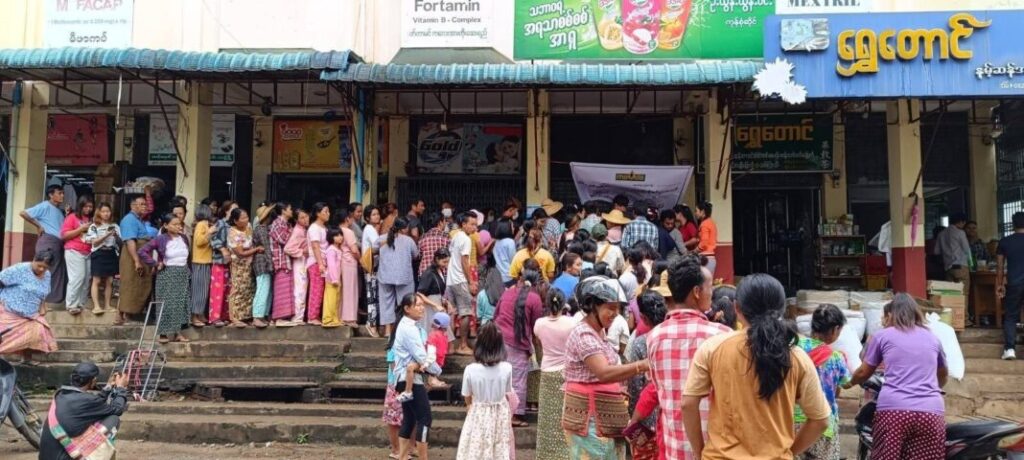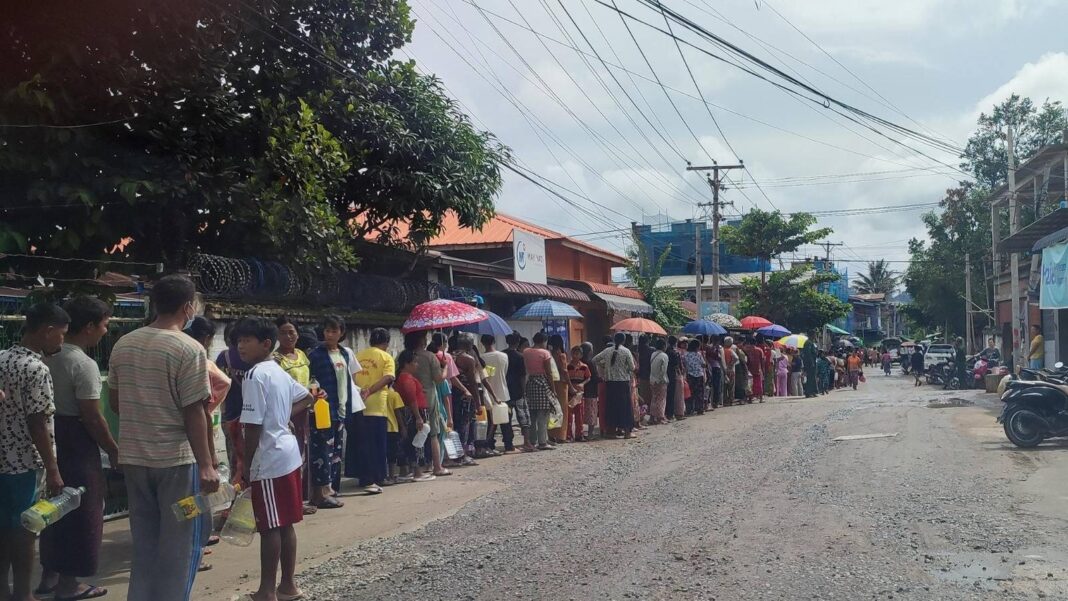A diverse mix of people, young and old alike, endured the hot sun, standing patiently in line, each one clutching a bottle in their hands. Their destination was a store nestled within the Lashio market in the northern Shan State.
The reason for their sense of urgency was the news circulating that palm oil was being sold for a mere 5,000 kyats per Viss, a price significantly lower than the usual market rate.
“We had been here since 7 o’clock in the morning. Upon our arrival, we found that many people were already in line. Elsewhere, a Viss of oil usually costs more than ten thousand kyats. In these challenging times, we have no choice but to opt for the most economical option,” shared a woman, aged over 40, as she patiently waited her turn to obtain a Viss of palm oil at the bustling Lashio city market.
Approximately a hundred people stood in line, all eager to secure a Viss of palm oil. Amidst the crowd, there were individuals attempting to cut in, while some families allowed 2-3 members to queue up separately, aiming to purchase larger quantities, the woman explained.
“Some families even brought their entire households to join the line, including children. It seemed as though the oil was being given away for free,” remarked the 40-year-old woman.

Following the coup d’état, the Military regime established the Commodity Price Stabilization Committee to tackle the surging costs of various commodities, including palm oil, across Myanmar. After the committee’s first meeting, the Union of Myanmar Federation of Chambers of Commerce and Industry (UMFCCI) publicly declared fixed prices for rice and oil.
Between September 10th and September 15th, during this specific period, the military council exerted pressure on Edible Oil Dealers Association in Lashio, located in the northern Shan State. They issued instructions for the sale of edible oil at lower prices.
From the end of August, when the military council took control of the edible oil market, a reference price of 4,400 kyats per Viss was set and maintained until at least mid-September 2023. Additionally, it was specified that if the sale of edible oil occurred through intermediaries, merchants or shops were instructed not to make a profit exceeding 10%.
Myanmar has long been recognized for its culinary tradition of using generous amounts of oil in various dishes, often referred to as the “big oil pot.” However, following the military coup, the price of edible oil skyrocketed to such an extent that it has become nearly impossible for people to sustain their previous levels of oil consumption.
“Oil prices were on the rise. So, it seemed like I had no choice but to opt for boiled food. Therefore, when it was being sold at such a low price, we had to buy as much as we could and store it,” said a woman who had been in the queue at the grocery store.
However, the edible oil that was being sold at a reduced price by the Myanmar Edible Oil Dealers Association was available only in limited quantities.
“It wasn’t that each person waiting in line could buy as much as they wanted. Many families added two or three members to the line because there was a restriction on the amount of edible oil sold. Unfortunately, some people in the queue couldn’t even make a purchase as the supply ran out,” the 40-year-old woman shared her experience, reflecting on the events of the previous month.
Similarly, in early August, palm oil was being sold at 4,100 kyats per viss in Aungpan, Kalaw Township, in southern Shan State, prompting a long queue of people, as reported by housewives from Aung Pan.
“People were lining up to buy it because the oil was much cheaper. We were unsure about the type of oil it was. The prices were significantly different from the usual rates, and we were also uncertain about the quality of the oil,” said a housewife in Aungpan.
Initially, each person in line was allowed to purchase two viss, but later, the restriction changed, allowing only one viss for each person. The truck selling the reduced-price edible oil had a banner or vinyl attached, labeling it as the Myanmar Edible Oil Dealers Association.
People were not sure whether the edible oils being sold in the market were of good quality or not and whether they were good for your health. Most people lining up to buy the oil were from the basic class, remarked Sai Fa, a resident of Lashio.
“Our family didn’t join the queue. We were unsure about the type and quality of the oil they were selling. The majority of those waiting in line belonged to the basic class,” Sai Fah added.
The military council’s attempt to control the sale of edible oil was perceived as the regime’s effort to garner support from the grassroots people, as pointed out and suspected by the residents of Lashio, Northern Shan State.
The reason behind the country’s economic decline and the soaring prices of commodities are the SAC regime; it is due to their coup that the country is now in chaos, remarked a housewife in Lashio.
“The increasing commodity prices are a result of the military coup. Now, because they want the people’s support again, they are asking for reduced oil prices. However, if the regime truly cared about the people, they should not have carried out the coup in the first place,” she added.
After the military coup, Myanmar has regressed to a state reminiscent of over 20 years ago. Just as people had to queue up to purchase used or engine oil, they now find themselves in lines for edible oil. Consequently, housewives are burdened with concerns on all fronts.
Myanmar heavily depends on imports from various foreign countries, and with reduced exports, any depreciation of the Myanmar kyat and a surge in foreign currency value will inevitably lead to an increase in commodity prices.
As a result, housewives are compelled to seek food and kitchen supplies at more affordable prices.
“No matter how much the military council lowers the oil price, a dictator remains a dictator. If the regime genuinely cares about the people, they should return power to the people. Stabilizing the country requires the military to relinquish power and restore it to the people,” emphasized the housewife from Lashio.

















Leave a Comments